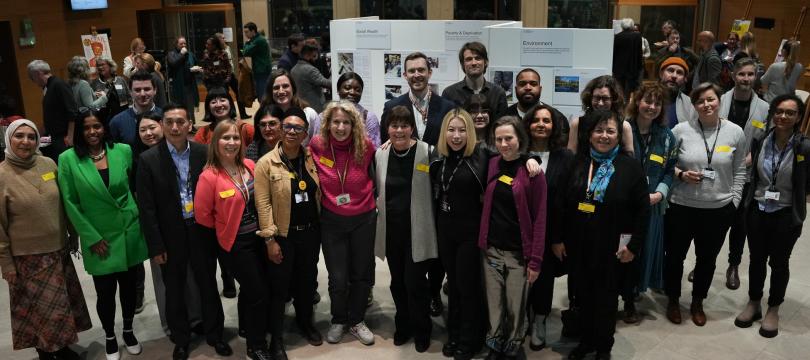Working with communities and enhancing student experience
Working with communities on teaching for positive social impact and enhanced student experience: UCL’s Marie Xypaki discusses the concept of Service-Learning/Community Engaged Learning and the UK's first national Network.
UCL’s Marie Xypaki discusses the concept of Community Engaged Learning and the first national Network on Service-Learning/Community Engaged Learning in the UK.

Working with communities on teaching for positive social impact and enhanced student experience
Working with our communities has never been more important. Traditionally, universities have been engaging with communities through research, but how do we build meaningful community experience into the curriculum? How do undergraduate and postgraduate students collaborate with communities, to apply their disciplinary knowledge to address real-world challenges and drive positive social change?
What is Service-Learning/Community Engaged Learning?
There are numerous definitions of Service-Learning/Community Engaged Learning (SL/CEL). For this discussion, we are choosing UCL’s definition as an example to demonstrate the key aspects of SL/CEL:
“Community Engaged Learning (CEL) is a form of experiential learning where students collaborate with external partners to address real-world challenges as part of their assignments”.
CEL is fundamentally about mutually beneficial relationships, which may also involve co-production of knowledge, activism and volunteering. Community partners (from grassroots to corporate organisations) can collaborate with students on a number of projects. For example, community partners can be guest lecturers and work with students in the classroom (virtual or not!), on role-playing activities, social justice projects, case studies, scenario-based activities, and problem-based activities.
The students can also visit the partners in situ and collaborate on: small scale community-based research projects (for example, urban planning students doing research with local groups to draft neighborhood plans);community-based consultancy projects (for example, law students offering advice to refugee applications under the supervision of their tutors; community-based design thinking projects, (for example engineering students build shelters for the homeless using crates); exhibitions’ object-based learning in museums, and many other forms of collaboration. Partners can offer students formative feedback enabling them to understand real-world needs better. In return, students produce outputs that are meaningful to the community. The sky's the limit!
For more examples on Community Engaged Learning, you can watch some interesting videos on the Community Engaged Learning Service pages.
How did the SL/CEL Network start?
A group of us – academics, teaching fellows and PE practitioners, from across several UK universities - came together almost a year ago to discuss how we could set up a UK Network on SL/CEL. This network would be a resource for practitioners who were interested in enhancing their SL/CEL practice and enriching their existing public engagement experience with curriculum projects.
On 6th May 2020, we had an initial virtual conference to gauge interest. 60 colleagues from across the UK came together online to explore the possibility of establishing a national network for Service-Learning/Community Engaged Learning. The interest was definitely there!
We were very pleased at the outcomes from the conference. There was a general consensus that this was a positive step, with participants keen to support and take part in the network. During the summer this enthusiasm continued through webinars and coffee sessions. Interest in the work of the Network, and in identifying ways to collaborate with communities on teaching projects, became clearer during our “Building an engaged practitioner network” session at the NCCPE Engage Festival in December 2020, where over 50 colleagues contributed their ideas and enthusiasm.
More information on our network can be found below.
Where are we going from here?
To build on this interest and enthusiasm, we have captured feedback from our peers, who have identified some key areas for the future work of the Network. These include working to:
Position the network as the national ‘Community of Practice’ for practitioners engaged in Service-Learning/Community Engaged Learning (SL/CEL) in the UK
Develop initiatives that increase the identity, visibility and value of SL/CEL in the UK
Document the landscape of SL/CEL in the UK to create a connected Community of Practice
You can find out more about the Network and its membership in our Terms of Reference. The Network is still developing and we are looking forward to some great adventures ahead.
How can you get involved?
Join the Network!
To join the SL/CEL Network, please sign up to the ServiceLearning@JISCmail.For any queries about the Network and our future events, email Andy on andy.coppins@ntu.ac.uk.
Further information
This blog was written by Marie Xypaki, Curriculum and Public Engagement Consultant (SFHEA), UCL. Follow Marie on Twitter @Mxypaki.
The other Members of the SL/CEL Committee are:
- Mark Charlton, Associate Director of Public Engagement, De Montfort University
- Sarah Thomson, Director of Social Impact and Engagement, De Montfort University
- Andy Coppins, Community Engagement and Volunteering Manager, Nottingham Trent University.
- Andrea Lyons-Lewis, Senior Lecturer and Service Learning Lead (Criminology), Nottingham Trent University.
- Sharon Hutchings, Senior Lecturer in Sociology and Service Learning Lead (Sociology), Nottingham Trent University.
- Patricia Zunszain, Reader in Neuroscience of Mental Health Education, Academic Lead for Service-Learning, King's College London
- Louise Gough, Director of Service Strategy and Planning, King’s College London.
